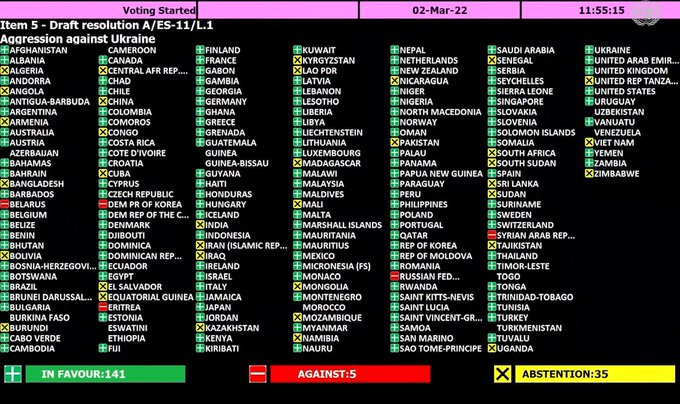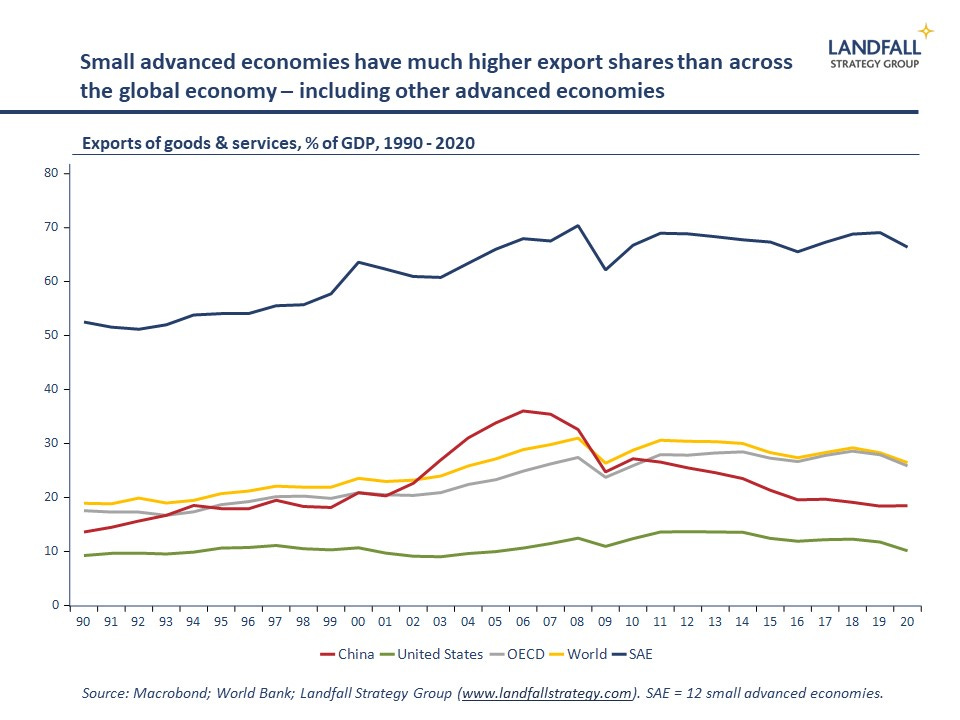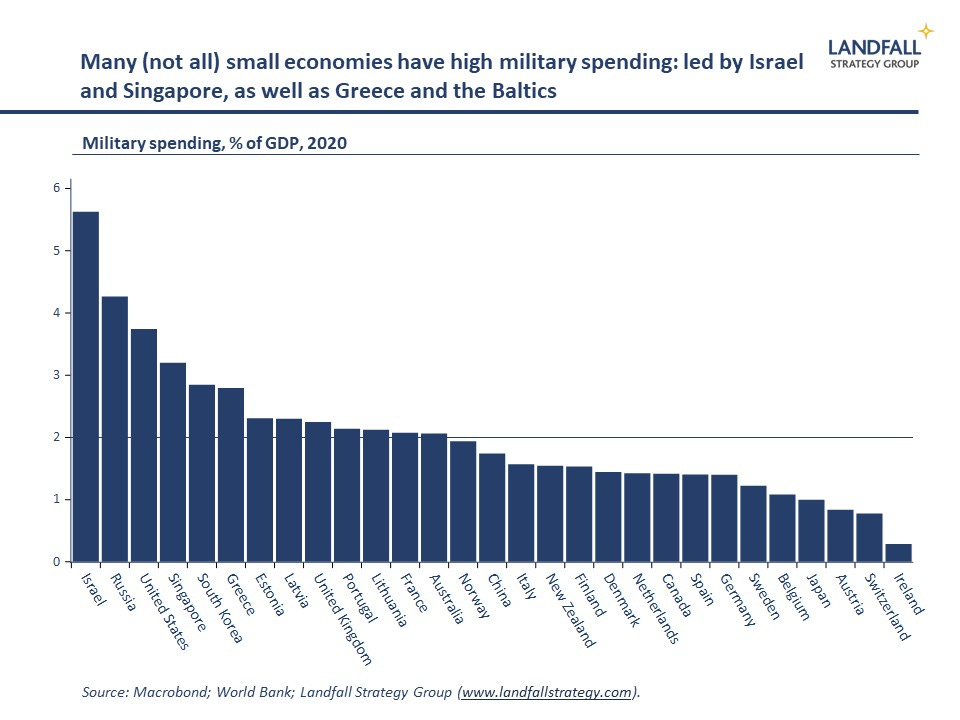
By David Skilling*
‘We are doomed to choose and every choice may entail an irreparable loss’, Isaiah Berlin
Around the world, countries are making choices in response to Russia’s invasion of Ukraine. From Europe and North America to the Asia Pacific, a broad group of countries have condemned Russia’s invasion as a breach of international law and imposed aggressive economic sanctions (‘the first world economic war’).
Russia’s invasion has crystallised the various challenges to the rules-based system, leading to fundamental changes in national positioning. The German government, for example, is signalling a reversal of decades of foreign policy and energy strategy – admitting to naivete on Russia, and committing to strengthen energy independence and increase military spending (although delivering on this will be very demanding).
The response to the invasion has also revealed the countries that are not aligning with the West. In the UN vote to condemn Russia’s invasion, China and India abstained, as well as multiple states in the Middle East, Africa, and Asia – together accounting for more than half of the world’s population.
The events of the past month represent a rupture in the global system, accelerating global fragmentation. Countries will increasingly coalesce around poles in the global system. It is likely that there will be a process of tightening up around ‘Western-aligned’ countries, a more pronounced decoupling of China (and Russia), as well as states trying to balance between the West and China (and Russia). Choices are being forced.
Small states as canaries in the mine
Small advanced economies are a useful place to look for guidance on these dynamics: the canaries in the mine of the global system, because of their deep external economic exposures and vulnerabilities to large power dominance.
The deep engagement of small advanced economies in the global economy creates exposures to external shocks, including the economic impact of the Russian invasion. Small economies can also be more readily squeezed by larger powers – and from Taiwan to the Baltics, there is an increasing frequency of these episodes.
These vulnerabilities mean that small states think very hard about their external positioning and global developments. In Europe, for example, it is the Baltics and Nordics that have had a sharp sense of the threat that Russia poses and the need to respond with economic, political, and security measures: Europe is belatedly converging to their perspectives. In Asia, Singapore invests heavily to understand global dynamics.
These features are one reason that many (not all) small advanced economies have high levels of military spending, notably Israel and Singapore. And several have raised military spending over the past few years, as geopolitical uncertainties have increased.
Because of these acute exposures – and the mindset that this creates – small advanced economies provide a useful perspective on international developments. Consider the following examples of change since the Russian invasion a month ago.
In Sweden and Finland, formal NATO membership is now firmly back on the agenda – with public majorities in favour in both countries, and political leadership (notably in Finland) moving in this direction. In Switzerland, neutrality has been set aside to allow for economic sanctions to be imposed on Russia - although this remains work in progress.
In New Zealand and Ireland, countries that share similar sensibilities and policy approaches, parallel debates are underway. Both have used geographic peripherality as a hedge against membership of formal alliances: Ireland has a tradition of military neutrality and is not a NATO member; and New Zealand unilaterally broke with ANZUS in the 1980s and prides itself on an independent foreign policy.
But New Zealand has just passed legislation allowing it to impose economic sanctions on Russia; and Ireland is actively debating the sustainability of its current stance. Over time, both are increasingly likely to make choices that move their policy approaches closer to their respective neighbours. This is complicated for New Zealand by its substantial economic relationship with China. As I noted last week, a fragmenting global economy is likely to require hard choices to be made with respect to exposures to China.
Elsewhere in Asia, Singapore has come out very strongly against the Russian invasion, both in words (a powerful UN speech) as well as in tough economic sanctions. Singapore views the integrity of the rules-based economic and political system as an existential issue, and has taken a stance that is distinctive relative to its ASEAN peers. Although Singapore also values ongoing economic and political engagement with China, it wants a rules-based system that protects small states.
But small states in the Middle East have been much more cautious. The UAE abstained in the UNSC vote on Russia, and Israel has not imposed economic sanctions on Russia. This is partly because of various economic and security exposures to Russia; and also because Israel has been very involved in the Russia/Ukraine negotiations.
End of the golden weather
I take a few overall observations from this recent small advanced economy experience.
First, there is a broadly-shared sense that the global system on which small advanced economies rely is facing deep threats: the Russian invasion and the Western-led response is less a discrete shock as much as a sign of regime change. This is galvanising a strategic response that would otherwise have happened more gradually.
Second, for small economies, there is an increasing awareness of safety in numbers. In Europe, the options are relatively straightforward; engagement through the EU and NATO. In Asia, it is more complex, involving the need to develop economic and security relationships with a range of larger partners. The broad direction of travel across Western-aligned small states is towards tighter relationships. In a more confronting geopolitical context, the benefits of autonomy and flexibility are increasingly outweighed by the benefits of deeper relationships.
Third, the more obvious fragmentation of the global economy along political lines is leading small advanced economies to more seriously consider managing political risks in export markets and supply chains. Responding to the integration of international commerce and geopolitics is an issue across advanced economies (strategic autonomy is a preoccupation in larger economies) but the size of external sectors in small advanced economies makes this a core strategic issue.
When advising governments on economic strategy, I often note that small advanced economies are ‘doomed to choose’: small economies cannot be competitive in everything, and need to make choices on areas of strategic focus in order to generate good outcomes.
‘The essence of strategy is choosing what not to do’, Michael Porter
And so it is here. Keeping options open by ‘balancing’ in response to these geopolitical dynamics may create more risk exposures for small advanced economies than it reduces.
For Western-aligned small states, a passive response will not support the rules-based system, will likely contribute to the accumulation of larger economic exposures, will likely worsen relations with other larger Western-aligned countries (who will be demanding more from small states), and may not buy much with countries that are challenging the system. Indeed, trying to balance may mean the worst of all worlds.
A 1990s-esque world, with the extension of the rules-based order and trade liberalisation, aggressive integration of China and other emerging markets into the global economy, and intense globalisation, was an ideal environment for small states. Strategic political choices with hard trade-offs were not required.
But that is not the world we are now in. Uncomfortable and costly though it is, hard strategic choices need to be made.
*David Skilling ((@dskilling) is director at economic advisory firm Landfall Strategy Group. You can subscribe to receive David Skilling’s notes by email here.
39 Comments
It's hard not to laugh whenever someone writes about our global "rules-based" system. The 2003 western-led invasion of Iraq, in violation of international law and condemned by the UN, was perhaps the clearest (but far from only) message to the world so far this century that rules don't matter: we do what we want.
We don't care about justification or evidence. The message to the UN was that you either support us in what we want to do, or you end up looking ineffectual and irrelevant when we go ahead and do it anyway.
That we can sit here today and lament the destruction of our "rules-based" global order now that Russia has decided to do the same thing, has got to be the height of hypocrisy.
NZ wasn't part of the "we" in the Iraq invasion. About the only time I agreed with Helen Clark.
No, but the point still stands. We haven't had a rules-based system in place for a very long time.
Rules are for Thee, not for Me....
People who say 'rules-based order' are NOT talking about an int'l law-based order, though that's what they want you to think. 'Rules' means American rules only. Rules-based order is a liberal world order. Americans use the phrase to mean "I can kill you, you can never retaliate."
On that basis no one has any right to tell anyone else what to do, ever.
Pretty clearly though, autocracies/kleptocracies are something the world doesn't need at all.
Western countries moral high ground over "autocracies" is diminishing by the day. Even in NZ examples include ability to override Bill of Rights at will (Covid response), undermining of democratic principles (Co-governance) and integration of media as an effective arm of government messaging.
Then there's the rank Australasian hypocrisy when Solomon Islands try to do the same thing that Ukraine did - choose their own alliance. Now you have Australia threatening invasion of Solomon's, exactly like Russia when Ukraine wanted to join NATO.
I'd also point out the western countries are the ones trying to make everyone else stop trading with Russia and China. There's zero of that coming in the other direction.
Probably will have to invade the Solomons. Probably not cheaper to buy the politicians. It's auction territory there
Remember that in the 1940s lots of young New Zealand men lost their lives there in the same cause.
"..., it don't make no difference to me, baby
Everybody's had to fight to be free, ..."
Refugee - Tom Petty
Democracy is as much a cultural habit as s a political system that takes decades/centuries to become the "way we do things". Difficult to engender (cant be imposed) & easy to undermine (co-governance). Ref the many lessons of history eg Afghanistan, Ukraine
The UN's uselessness is the reason Iraq was invaded by an independent coalition. Not the other way around.
It's incapable of enforcing it's own rules.
Weird the way people always reach for Iraq and not US actions in South America.
Either way rules don't apply to superpowers as far ahead of the rest of the world as the US is. Also the UN is a pathetic institution and has failed at carrying out its principal objectives.
Not just superpowers. Didn't NZ lean on Fiji.
Great post chebbo!
Small nations, by virtue of their size, cannot be too assertive. NZ has spoken loud and clear, thread carefully when the giants are around.
Despite talking of peace and common prosperity, China can be a harsh master, using economic or military might. The Taliban of Afghanistan were in China for talks, Solomon Islands have a deal with China. China have many friends in Africa, from infrastructure to commercial actions. The Foreign Minister of China is active, jetting to India, Ethiopia and met with Russian counterpart.
China has become the leader of the communist world, by adopting capitalism.
If you actually look at the difference China use soft power. They negotiate with other nations using mutually beneficial offers, its called diplomacy and how politics should always be done. Where as America demands obeisance to its economic needs and forces compliance using the World Bank and IMF, coup attempts and destabilisation. There is a huge difference between the two. Tell me how many instances of regime change China has attempted? How many instances of destabilisation it has perpetrated? How many economic sanctions it has pushed on developing nations? How many debt traps that have actually undermined the economic growth and stability of nations it has negotiated loans and infrastructure in? China actually see the benefit of mutual growth and prosperity across the globe, while America only seeks to protect its power and hegemony and project access to resources in these same situations. How many developing nations have actually broken through to the first world with Americas ‘help’ following Americas rules?
How many countries have moved from poverty to reasonable wealth with Americas encouragement? Start with every country in Europe receiving Marshall plan aid. Singapore, Taiwan, South Korea, Japan. Of course you can define 'developing' to mean not in the top say 30 countries but then the question is meaningless. Check Wikipedia for "GDP (real) per capita growth rate" and the doubling time for the world [1960 to 2018] is 37 years but much faster growth rate of 10 years by the leading growth country: China (mainly their own efforts but with some help from America) but then these countries which are more permanently influenced by America: Singapore, Malaysia, Turkey, Panama, Chile.
China has been a destabilising force with its fighting on the Indian border, invasion of Tibet, extravagant claims to the South China sea and building military installations on reefs. I'm not sure of the sources but on this site I've read commentators claiming China has used debt traps to obtain control of ports in the Indian ocean.
Keynes was way ahead of everyone.
https://en.wikipedia.org/wiki/Triffin_dilemma#:~:text=The%20Triffin%20d….
Uncomfortable and costly though it is, hard strategic choices need to be made.
Indeed - Gazprom Halts Gas Shipments To Europe Via Critical Pipeline
WOW! Thanks for the link, wedged between a crevasse and a very hard place. May I suggest to other Interest commenters to read Audaxes link
Zoltan Poszar (Credit Suisse) takes a wander through the NWO- commodities rule because you cannot "print oil to heat or wheat to eat".
So, getting-mining, growing- them, plus transporting them - shipping, protecting, insuring, funding- has instantly come into sharp focus.
If the Porter quote about choosing what NOT to do has any validity here, it must imply: stay on civil terms with China.......because Russia/China/Iran/India are the new Eastern pole of a multipolar world.
Love em or hate em we have to stick with the Australians. Our only real connection in a cruel world.
and the USA
the article displays a typical and strong Anglo-Saxon centric world so vividly.
Global, in the author's view, is equivalent to the collection of five eyes, EU, Japan and Israel only. And the rules that are made by these countries should only be regard as the rules to obey. This concept has long passed its date.
Russia's performance in Ukraine and China's handling of Omicron will seriously damage their reputations at home and abroad. There's a reason why Five Eyes and the EU are shown a lot of respect.
Russia can only improve. Kill and sack enough generals and they may end up with another Zhukov in charge.
China may defeat Omicron - we just don't know yet.
Omicron cannot be defeated without severe authoritarian lockdown. Probably not even with that. Russian people will have lost confidence in the army's ability to reasonably protect their sons. This will be hard to reverse. No one is looking at Russia and China and thinking it would be great to live there. I don't think that's going to change anytime soon while every Five Eyes country is a desirable place for an individual to live.
Many countries have a long way to go with their human rights development before they reach the level of Western Europe and Five Eyes countries.
Very interesting article David.
I repost here a comment I made yesterday as I think it's more relevant in this thread:
by Yvil | 2nd Apr 22, 10:29am
I suppose, as a western democratic nation, we in NZ have to be very happy with the economic developments in 2022, the atrocities of the war aside of course. It seems to me that, this year, the democratic west has shown tremendous unity and strength, and it looks as if the rising power that China is (and that Russia would like to be) is failing at the expense of a stronger USA.
Thoughts anyone?
I do however see how smaller nations like NZ are going to find it tougher to form alliances both in a military and an economic sense
Lavrov's rejoinder:
“A new reality is being formed: the unipolar world is irrevocably becoming a thing of the past, a multipolar one is taking shape. It’s an objective process. It’s unstoppable. In this reality, more than one power will “rule” – it will be necessary to negotiate between all the key states that today have a decisive influence on the world economy and politics. At the same time, realizing their special situation, these countries ensure compliance with the basic principles of the UN Charter, including the fundamental one – the sovereign equality of states. No one on this Earth should be seen as a minor player. Everyone is equal and sovereign.”
Wishful thinking. There is only one game in town, that is the OECD countries. As Russia is finding out in Ukraine, you cross them at your own peril because that sixth of the worlds population has half of the wealth. We get what we want because we have the military and economic resources. Population or geographic size is irrelevant.
Well said Squishy, I fully agree.
The US remains the worlds preeminent superpower. China and Russia are already in the demographic twilight. There aren't any real decisions to be made, we have been and will remain aligned with the Anglosphere which is proximate to NATO.
This demographic twilight concept is weird. In the distant past having more soldiers and farmers meant you were more powerful. But surely the Dutch, Portuguese and British developing world straddling empires despite comparative lack of population is proof that population is a minor factor for success. Even wealth isn't since the old empires in Asia, Africa and South America defeated by those small European countries were far wealthier than Europe. Technology and communications are what underpin success. British iron ships powered by coal made Asian shipping obsolete. A modern China with its emphasis on science and engineering and smaller population will more than match western countries. Or at least it will if not held back by a primitive autocracy.
I think your last sentence is key, democracies, despite all their shortcomings lead to wealthier, more powerful nations than autocracies ever will. This is the reason why the biggest country in the world is so weak and why China will not ever truly compete with the USA
It has been the case in the past only coincidentally because the Reserve Currency system has allowed the Americans (and previously Brits) to spend beyond their means. Currency dominance has been intertwined with geopolitical dominance.
The last part of the puzzle, "western values" are looking more and more tenuous as western society rips itself apart in the "woke wars". For example, compare the quality of our education system with that of China. In another generation we simply won't be able to compete on any level.
You are too optimistic. China is already competing; in some areas it is winning. 'Ever' is a long time. Look at history - Portugal went from a being minor nation with a few mainly fishing ships to conquering the immensely wealthy Spice Islands half a world away in under 30 years. The mighty Inca empire collapsed fast as did the USSR.
Opportunity lost post GFC....we are living with the consequences of that failure.
"Zhou argued that part of the reason for the original Bretton Woods system breaking down was the refusal to adopt Keynes' bancor which would have been a special international reserve currency to be used instead of the dollar.
American economists such as Brad DeLong agreed that on almost every point where Keynes was overruled by the Americans during the Bretton Woods negotiations, he was later proved correct by events.[4]
Zhou's proposal attracted much international attention;[5] in a November 2009 article published in Foreign Affairs magazine, economist C. Fred Bergsten argued that Zhou's suggestion or a similar change to the International Monetary System would be in the best interests in both the United States and the rest of the world.[6] While Zhou's proposal has not yet been adopted, leaders meeting in April at the 2009 G-20 London summit agreed to allow 250 billion SDRs to be created by the IMF, to be distributed to all IMF members according to each country's voting rights.
On April 13, 2010, the Strategy, Policy and Review Department of the IMF published a comprehensive report examining these aforementioned problems as well as other world reserve currency considerations, recommending that the world adopt a global reserve currency (bancor) and that a global central bank be established to administer such a currency.[7] In this report, the current issues with having a national global reserve currency are addressed. The merits, difficulties and effectiveness of establishing a multi-currency reserve system are weighed against that of the SDRs, or "basket currency" strategy, and those of establishing this new "global reserve currency". A new multilateral framework and "multi-polar system" for managing capital flows and national debts is also called for, but the IMF cautions that it prefers a gradual shift to this new framework, rather than a sudden change."
https://en.wikipedia.org/wiki/Triffin_dilemma#:~:text=The%20Triffin%20d…
I first noticed our move East in 1990. After the share market crash in 1987 NZ resorted to mass Asian immigration as so many people were leaving our fair shores, mostly to Australia. Since then we've become one part Asian with around 300,000 or more now calling NZ home. This brings me to my point about the article: We're damned if we do & we're damned if we don't. How long can we have a foot in both camps when they are separating at pace. It is indeed a clash of cultures, but for me, it's more leadership cultures than anything. Both have created significant wealth by employing capitalist ideas, but one wants to continue to rule from the top down whilst the other is still keen (just) to have the people decide. It was some 20 years later, however, that I sensed an imbalance being created. China was buying most of our food & as we had very little choice at the time, we took it, and I believe this has underwritten our wealth as a small nation for the past 20 years. Even though I am an Anglo descendant & love America, they don't butter my bread. This is a tough question to answer & right now, I can't answer it.
Agreed John, unfortunately the west hasn't the capacity to take all our primary produce. We are tied economically to Asia. Basically we are in the Asian sphere of influence, just look at the Aus India trade deal. Thats where we will be heading next. A fine line we have to walk.
https://www.1news.co.nz/2022/04/03/taiwanese-flag-on-menu-prompts-one-s…
Judging by the "" eight more one-star reviews with no mention of the food or service "' there are at least 8 of those 300,000 Asians who slavishly follow CCP instruction. Many of the Kiwis of Chinese origin that I meet are decidedly anti-Communist but most avoid politics. If China invaded Taiwan would that start a violent conflict in NZ?




We welcome your comments below. If you are not already registered, please register to comment
Remember we welcome robust, respectful and insightful debate. We don't welcome abusive or defamatory comments and will de-register those repeatedly making such comments. Our current comment policy is here.